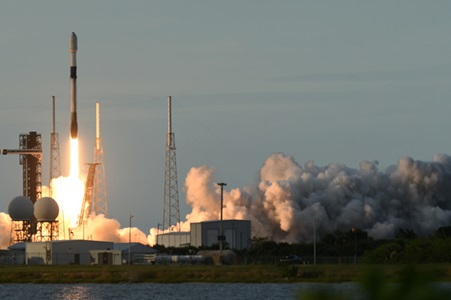The new geostationary communication satellite will provide emergency communication services, especially television broadcasting, in a wide coverage area.
 Türkiye has officially placed its first domestically produced communication satellite, Türksat 6A, into service during a ceremony on April 21, attended by President Recep Tayyip Erdoğan. The president described the event as a significant milestone in the country’s push to develop space technologies independently, emphasising that Türksat 6A represents a breakthrough in reducing reliance on foreign sources.
Türkiye has officially placed its first domestically produced communication satellite, Türksat 6A, into service during a ceremony on April 21, attended by President Recep Tayyip Erdoğan. The president described the event as a significant milestone in the country’s push to develop space technologies independently, emphasising that Türksat 6A represents a breakthrough in reducing reliance on foreign sources.
The satellite was launched into orbit on July 9, 2024, aboard a SpaceX Falcon 9 rocket from Cape Canaveral, Florida. After months of testing, all technical assessments have been successfully completed, allowing the satellite to commence operations. Speaking at the inauguration held at Türksat’s Gölbaşı Campus in Ankara, Erdoğan praised the smooth execution of the project and expressed hope that Türksat 6A will serve the nation well.
With Türksat 6A now operational, the number of communication satellites managed by Türksat rises to six, while the total number of Turkish satellites in orbit reaches 10. The satellite, which is expected to function for at least 15 years, will provide broad communication services including television broadcasting and emergency communications across an extensive coverage area.
Erdoğan highlighted that the satellite was developed with more than 80% domestic components, placing Türkiye among only 11 nations globally capable of producing their own communications satellites. He emphasised that Türksat 6A is the result of two decades of intensive research and development aimed at fostering self-reliance in advanced technologies.
The new satellite significantly expands the global reach of Türkiyes satellite services, increasing population coverage from 3.5bn to 5bn. Erdoğan noted that this success opens the door for the creation of a national satellite brand and the establishment of a domestic space company.
He also underlined the collaborative nature of the project, which engaged a wide network of local stakeholders and subcontractors, including Turkish Aerospace Industries (TAI), Aselsan and TÜB?TAK. The initiative helped nurture a skilled workforce, with engineers and technicians playing key roles throughout the design, production and testing phases. The president added that Türkiye’s strengthened export capacity and international competitiveness in satellite equipment mark a turning point for the nation’s space ambitions.
The commissioning of Türksat 6A aligns with Türkiye’s broader National Space Programme. Industry and Technology Minister Mehmet Fatih Kac?r hailed the development on social media, affirming that the achievement underscores the country’s growing expertise and independence in space technology.
Türksat 6A reached its designated orbit by December 2024 and successfully completed its initial broadcast tests by February, signalling its readiness for full operational deployment.












































































